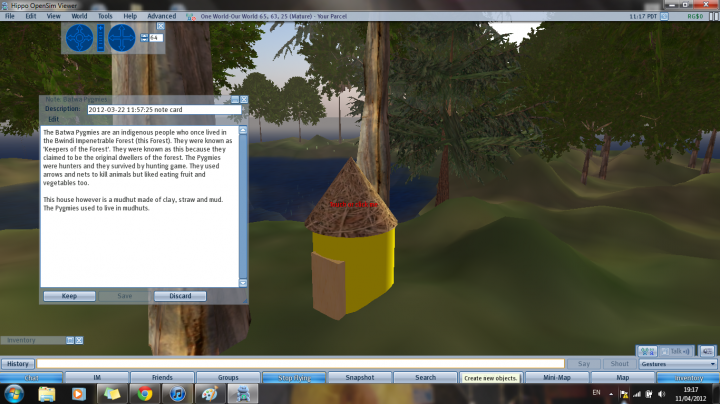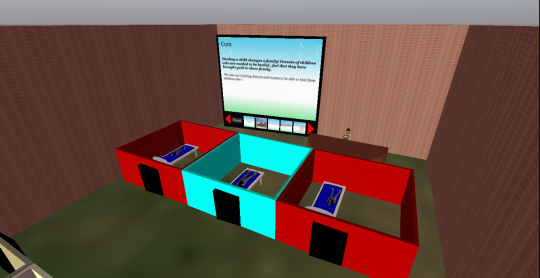Francesca Hunt reports on using virtual technologies as a teaching tool for exploring world development issues with her primary school class.

It is not unusual to observe a 5 year old using their parent’s smart phone to play games, take photos and videos. Neither is it unusual to find a 5 year old navigating a laptop, desktop, tablet or an interactive whiteboard.
If this is what a 5 year old is capable of then what can we expect from senior primary school students and how can we advance their technical proficiency through education?
This is where development education comes in and formed the basis of my technology and learning master’s dissertation in early 2012.
Development education (DE) is not a curricular subject in the Irish Primary School Curriculum but falls under the subject areas of Geography and Social and Personal Health Education. This means that:
- There is no pre-defined DE content (or curriculum).
- Up-to-date resources are difficult and time consuming to source.
- Resources published by NGOs can be costly.
- Resources often have religious connotations, which therefore render them unsuitable for use in certain schools.
However, I don’t see these as obstacles to teaching development education, but rather as exciting opportunities for teachers and students!
| Obstacles to the teaching and learning of development education | Solutions to these obstacles |
| Lack of content and curriculum | No constraints, the teacher can feel free to explore without having to meet prescribed educational objectives |
| Lack of resources | Make your own (with the students if possible) |
| Time consuming | Make development education cross-curricular and integrated into your subject area planning |
A major area of research in my dissertation looked at the kinds of methodologies and pedagogies used by teachers in the teaching and learning processes of development education.
If we are striving to develop “awareness and understanding of the rapidly changing, interdependent and unequal world in which we live” (DICE, 2003), DE classes have to be engaging and different in style and pedagogy to other curricular subjects.
Ultimately we teach development education so that the children are aware of the issues faced by people nationally and globally and we want them to be informed so as they can become actively part of our society in the fight for a more just world. Therefore I believe development education should be taught using experiential learning theory, discovery learning peer teaching and learning (see Sugata Mutra’s TED talk for more on this).
Simply, children need to engage with the content, feel connected to it, discuss it with their peers to enable them to form a rounded opinion and to problem solve the issues raised. Children should be put on the right track and encouraged to discover things for themselves, again helping to engage them with the content.
The more engaging the experience of development education, the more success we have of raising awareness, understanding and empathy within the children.
We are limited only by our imaginations…
My research was based on exploring the use of virtual worlds for the teaching and learning of development education in primary schools.
My research started in 2011 when I ran a 6 week computer club for 6th class children based on Haiti. Using a secure and age-appropriate virtual world, I built a representation of Haiti and embedded a challenge within the build. Children had to work in pairs to discover facts about Haiti before and after the earthquake. They took notes using the communication features of the virtual world and then shared these with others in the group through the use of interactive graffiti boards.
After this short project, I decided it would be better to hand over control to the children. I chose a developing country and some relevant development education issues such as fair trade and conflict resolution.
Using didactic teaching methods (building varied and dynamic activities, methods and teaching approaches) initially (to ensure children had the basic facts), research, images, video, drama and role play, the children learned about the chosen country and development education issues. I chose to focus on Uganda as this was to be Trócaire’s focus country for their Lenten campaign. This meant that when the learning experience was coming to fruition it was relevant in the children’s world.
They were going to be seeing Uganda on the television, at bus and train stops etc. I chose fair trade and conflict resolution as I saw these as being very age appropriate and relevant to the lives of the children.
So what happened? The results
Twelve 6th class children signed up for a computer club which ran for an hour a week after school on Monday. From September to Christmas 2011 the children learned various social and technical skills which would be needed to help them work in a virtual world. From January to April the children worked on building their own group interactive representation of Uganda incorporating content learned through the earlier project research.
To do this the children had to plan what content was going into their representation, where everything would be placed within the world, how the information was going to be made interactive and who was in charge of what areas. The children requested extra computer club classes after school to work on their building and scripting.
In the end the children were staying behind school every Monday, Wednesday and Friday – which is a big deal for 12year olds! In their build, the children included a Ugandan village, a fair trade coffee shop, a rainforest, a coffee plantation, a school and a hospital. The village had two different types of homes to reflect the different homes found in Uganda and taught people about life in Uganda. The hospital taught people about neurosurgical operations in Uganda. The school contained information about typical school life in Uganda.

When the representation was built, a group of 5th class children participated in a computer club run by the 6th class children over a week. The 6th class children taught their peers the necessary computer skills and then supervised them as they engaged with the virtual world representation.
This was huge for the 6th class children.
They had to stand up in front of their peers and teach them. The saw that the representation they built had uses for their peers and others and it was a project with meaning. Additionally, the children stood up and presented their work to their parents and people from Trócaire, which is daunting for children that age.
My research found that:
- The children developed their technical proficiency, learned about a developing country and some development education issues.
- They learned about how they themselves learn (through reflective journals).
- They also gained self-confidence through teaching peers and presenting their work to others.
A huge factor in the success of the computer club was the gradual building of pride, achievement, project ownership and motivation experienced by the pupils.
The children owned and had full control over the building of the virtual world representation, which lead to increased levels of motivation. High motivation levels impacted upon the children’s sense of pride and achievement, which in turn fueled their motivation.
I wouldn’t expect teachers to take on such a challenge in the classroom as it was difficult and time consuming. However the benefits and learning for the children were huge.
I would advocate that teachers try new and exciting ways to teach development education and where possible, have the children help make the resources which can then be shared with other classes giving them meaning and purpose.
Ultimately we want to engage the children emotionally and intellectually with the content and ideas of development education so that it stays with them throughout their lives and encourages them to fight for a just world in whatever way they can.
Francesca Hunt has a strong relationship with Trócaire’s Development Education team, whose work is very much integrated into her teaching in the classroom. The 5th and 6thclass pupils involved in this project participated in a Uganda workshop facilitated by Trócaire’s Primary Education Officer, Lydia McCarthy. Some of her pupils also chose to use information from the Lent 2012 Development Education resource pack on Uganda in their virtual world.
Francesca’s dissertation can be downloaded in full from the TCD website: Exploring the use of virtual worlds for the teaching and learning of development education in primary schools (April 2012)
